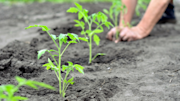Ideas to help tackle condensation in your home
Homegrown: top tips for growing vegetables

You could be forgiven for believing that gardening is reserved for stately lawns and discerning botanists. However, just about anyone can pick up a trowel and start planting, no matter how extensive their gardening knowledge is.
It’s not just a pastime for the older generation either. More than 75 per cent of young people admit to being horticulture enthusiasts, with many marking gardening programmes among their favourite TV shows.
If you're looking to get started in the gardening world, you might want to know a few top tips before you get stuck in. So, here are at the best ways to grow vegetables at home or on an allotment.

What do I need?
The beauty of growing your own vegetables is that it’s extremely economical. Think of all that money you could save. All you need to get started are a few seeds, some good quality compost, a few grow bags and some pest repellent for when the crops begin to grow.
Where should I plant my vegetables?
If you plant your vegetables in a suitable place, you could experience a great crop. Plant them in a spot that’s unfit for purpose however and you might have to endure a joyless growing season wondering where it all went wrong!
To give your vegetables the best chance of flourishing, there are a few things you need to know before you start planting.
Firstly, consider the three S’s: sun, shade and shelter. Some crops will grow in the shade but it is unlikely they will grow to their full potential.
According to the Royal Horticulture Society, there are only a few vegetables that thrive in shaded areas. These include endive, lettuce, radicchio, peas and spinach. If possible, try to make sure your veggies are in a sunny spot where there is also plenty of shelter from heavy rain and wind.
Another ‘S’ to watch out for is 'stealing'. Trees and large plants like to steal nutrients from the surrounding soil, which in turn affects the amount of nourishment smaller plants receive. Planting your vegetables away from larger plants should provide greater growing opportunity for your crops.

Which vegetables should I plant?
It all depends on what time of year you plant your crops. Vegetables like broccoli and Brussels sprouts flourish in summertime, whilst peas are better suited to the colder months.
If you are unsure when the best time to plant your vegetables is, take a look at the RHS Vegetable Planner. Here you can see all there is to know about when to harvest your vegetables.
A few more tips
- try mulching. Mulches are loose coverings that sit on top of cultivated soil. These help to retain moisture and suppress weeds. You can read more about mulching by visiting the RHS website.
- avoid soaking dry soil as this can cause the crops to split at the root. Instead, aim to keep soil evenly moist throughout the year.
- lukewarm water is best for plants, as some crops such as runner beans can suffer shock from cold water. This could lead to poor plant growth.
- a general fertiliser provides crops with a steady supply of nutrients. Add a week before planting your vegetables so there is an even distribution.
- vegetables in a container will only have enough nutrients to sustain five or six weeks of growth. You don’t need to take them out of their container after this time, but you will need to start regularly feeding them with a liquid feed or fertiliser.
Exclusive offers for Co-op Members

Home insurance
Exclusive member price on home insurance.
Your discount is not available on add ons and is applied if your details match those on our membership database.

Renters insurance
Co-op Members who take out renters insurance will get a 5% discount.
Member discount applied if matched during quote process.





